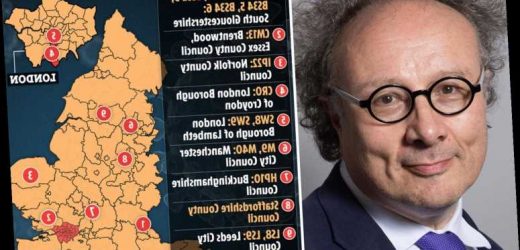THE BRAZIL Covid variant could slow down the rapid vaccine rollout, an expert has warned.
Danny Altmann, professor of immunology at Imperial College, said the new strain – detected for the first time in the UK – could also make jabs "less potent".
? Read our coronavirus live blog for the latest news & updates…
The Brazilian variant, named P.1, has mutations that help it to dodge antibodies produced by the immune system, either by vaccination or infection.
It has been detected three times in Scotland and three times in England – but health officials admit they have not been able to identify who one of the infected people is.
Asked about how worried people should be about the Brazilian variant, Prof Altmann said: “Somewhat worried but not total panic, perhaps.
“It’s somewhat more worrying than the UK variant, the Kent variant, that we’re used to talking about, because it covers the double whammy, we think, of being more transmissible and somewhat better at evading neutralising antibodies.”
On what it would mean for the vaccination programme if the variant became widespread, he added: “The way I think about it is it’s a bit like, and I think about the effect that the Kent variant had on us, it just slowed everything up because suddenly things started to get a little bit worse again, and you know the end seemed a little bit further away.”
The vaccination programme in the UK has so far reached 20 million people, and is ebbing closer to the younger age groups.
But ministers know they are in a race against new variants, which threaten to make vaccines less effective.
Prof Altmann said looking at how well the Brazilian variant is killed off by variants, “it’s not that all immunity is gone, it’s that the vaccines look so much less potent”.
He added: “So there’ll be more people who have low antibody responses where it can break through and get affected. It all comes back much harder.”
Prof Altmann said it looks likely the Brazilian variant is "breaking through" antibodies built up by previous infection.
This could mean people who have previously been infected with Covid are at risk of catching it again.
Citing research on the Brazilian city of Manaus, where the variant emerged, Prof Altmann said analysis of antibodies in blood bank samples showed the city had one of the highest levels of immunity in the world – "perhaps more than 70 per cent".
"And yet they're seeing this enormous wave of reinfections", he said.
"So, if you put two and two together their assumption is that's because the new variant is breaking through those antibodies. But if that hadn't really been proven yet, it looks likely."
He added that border controls and test and trace “hasn’t been our biggest strength”.
Vaccines minister Nadhim Zahawi said P.1 was “a concern” because it had similar mutations to the South African variant – which has been shown in studies to reduce vaccine efficacy.
Lawrence Young, a virologist and professor of oncology at Warwick Medical School, said: "Both the variants have a mutation called E484K, which has been shown in lab experiments to dodge antibodies in the blood of people vaccinated against Covid.
"The E484K mutation appears to provide some escape from immune recognition – it prevents virus infection from being completely blocked by certain monoclonal antibodies and by the antibodies induced by certain vaccines."
Dr Susan Hopkins also said the P1 variant is similar to the variant from South Africa, with their mutations thought to increase transmissibility.
What is the P1 Brazilian variant?
THE BRAZILIAN variant (P.1) carries three key mutations that affect the spike protein.
The spike protein is the part of the virus, SARS-Cov-2, that attaches to human cells and allows the virus to infect the body.
As a result, it is the part of the virus that the Covid vaccines are designed to target.
That's why scientists believe while the jabs should still work, they could be less effective against the Brazilian and South African strains.
Experts first detected the P.1 variant in Manaus, north Brazil, in December.
It is not yet known if the mutation causes more severe Covid-19, but evidence suggests it may be more transmissible.
Porton Down scientists are conducting more analysis to confirm evidence that indicates the strain does not cause any higher mortality rate or that it affects the vaccines or treatments.
It was detected in Brazil and in travellers from Brazil to Japan, and contains a unique constellation of lineage defining mutations.
Like the South African variant, the Brazilian one carries a mutation in the spike protein called E484K, which is not present in the original UK strain, or the widely circulating Kent strain.
The E484K mutation is present in the South African and Bristol strains.
The E484K mutation is thought to help the virus bypass the immune protection provided by prior infection or vaccination through antibodies.
Scientists analysing the Brazilian variant say the mutations it shares with the South African variant seem to be associated with a rapid increase in cases in locations where previous attack rates are thought to be very high.
They say it is therefore essential to rapidly investigate whether there is an increased rate of re-infection in previously exposed individuals.
“Manaus, in particular, reported that a number of individuals were reinfected with this variant, and therefore that suggests that having had prior immunity from primary infection wasn’t enough to reduce infection and transmission,” she said.
“And that may also impact on the vaccine.”
But Prof Adam Finn, from the University of Bristol and a member of the Joint Committee on Vaccination and Immunisation (JCVI), said scientists are "optimistic" that the Covid-19 vaccines will still prevent severe disease when tested against new variants.
He told BBC Breakfast: "At the moment, the evidence we have suggests that certainly the South African variant, and potentially this Brazilian variant – which is somewhat similar – the vaccines that we have at the moment are less effective at reducing at least mild disease and possibly transmission.
"We're optimistic that the vaccines will continue to prevent severe disease but the evidence for that is still fairly limited.
"I think all the manufacturers are now working on the preliminary steps, if you like, to revising the vaccines if that proves necessary.
"But for the moment the vaccines that we're using are very effective against the strains that are predominantly circulating in the UK and it's important that people understand that that's still the case because we do need people to get immunised as fast as possible to get things under control."
Two cases of the Brazilian variant were detected in South Gloucestershire – where surge testing is underway from today.
The Gloucestershire cluster was said to originate from one individual who travelled back from Brazil and arrived in London on February 10.
It was five days before the quarantine hotel policy came into force, leading to criticism of the Government’s dithering.
There were three more cases of Covid in the travellers household – one has been confirmed as the P.1 strain kent so far.
Mr Zahawi said one had travelled from Sao Paulo through Zurich to London prior to the hotel quarantine, and health officials are working to contact anyone on the Swiss Air flight LX318.
But one person in England who has been infected with P.1 – found through genetic sequencing of test samples – has not been formally identified.
A nationwide search is now under way for the mystery person, who did not correctly fill in their contact details on their test registration.
The person is not believed to be linked to the other household in South Gloucestershire because the virus was found to have slight genetic differences.
Officials said the individual’s test was processed on February 14, so believe it is likely they took it a day or two earlier.
Anyone who took a test on February 12 or 13 and has not received a result, or has an uncompleted test registration card, is being asked to come forward immediately, as health officials scramble to track down the individual.
Source: Read Full Article









